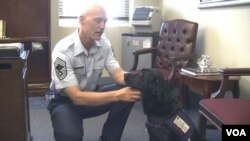WASHINGTON – According to a Rand Corporation study, more than 26 percent of American troops deployed overseas have returned to the US with traumatic brain injuries and post traumatic stress disorder or PTSD since 2001. Experimental programs that pair combat veterans suffering from brain injuries and PTSD with therapy dogs have showed positive results. Now four U.S. military bases have programs with dogs. Chief Master Sgt. Richard Simonsen, who was injured twice in combat, has benefited from the program.
Simonsen, the senior enlisted leader at Joint Base Anacostia-Bolling in Washington, D.C. suffers from post traumatic stress disorder and a traumatic brain injury he received while deployed in Afghanistan. He's been working with Yoko, a Black Labrador retriever, in his struggle through it.
“I think sometimes she realizes when I have a particularly tough email that I have to write, she would interrupt me and say, it’s Yoko time, it’s time to pet my belly. And she is usually right," he admits.
Simonsen received Yoko from "Paws for Purple Hearts", a group that provides therapy dogs to members of the military. Yoko's job: to help Simonsen adjust back home. Yoko can follow more than 90 commands.
Since returning home, Simonsen has been battling anxiety, depression and memory loss, like thousands of other combat veterans suffering from the mental wounds of war.
“The things that were really easy for me, were a little more difficult, hard sometimes," he explains, "and the things in life that you can do but you struggle at doing them, became impossible."
Simonsen says since he received Yoko, life has become easier.
“Mild traumatic brain injury and post-traumatic stress disorder or PTSD have a lot of overlapping symptoms," explains Dr. Michael Yochelson, the medical director at MedStar National Rehabilitation Hospital in Washington. "The symptoms include difficulty concentrating, a lot of fatigue, irritability, depressed mood, sadness, anxiety.”
Dr.Yochelson says medication and psychotherapy are the usual treatments, but pet therapy also helps.
"We actually have pets that come in that are specially trained and we do that in our hospital here,” he says.
Yoko, like other therapy dogs, received two years of special training so she can sense when her companion is depressed and be both unobtrusive and an unconditional friend.
Simonsen takes Yoko wherever he goes on the base. He says having a dog at his side has helped him and others open up.
“I am the guy with the dog,” he jokes.
When the Chief Simonsen is with his family, Yoko is off duty. But Simonsen's daughter Rachel says since Yoko came to live with them, her father is less irritable.
“I am very proud to call him my dad, and I love Yoko for what she does for him every day," she says.
“I don’t think everyone needs to walk around with a service dog," Simonsen notes, "but I think there are more veterans out there, whether they are on active duty or not, who would benefit from at least time with dogs.”
For Simonsen, the slow road to healing is easier now with his four-legged friend at his side.
Simonsen, the senior enlisted leader at Joint Base Anacostia-Bolling in Washington, D.C. suffers from post traumatic stress disorder and a traumatic brain injury he received while deployed in Afghanistan. He's been working with Yoko, a Black Labrador retriever, in his struggle through it.
“I think sometimes she realizes when I have a particularly tough email that I have to write, she would interrupt me and say, it’s Yoko time, it’s time to pet my belly. And she is usually right," he admits.
Simonsen received Yoko from "Paws for Purple Hearts", a group that provides therapy dogs to members of the military. Yoko's job: to help Simonsen adjust back home. Yoko can follow more than 90 commands.
Since returning home, Simonsen has been battling anxiety, depression and memory loss, like thousands of other combat veterans suffering from the mental wounds of war.
“The things that were really easy for me, were a little more difficult, hard sometimes," he explains, "and the things in life that you can do but you struggle at doing them, became impossible."
Simonsen says since he received Yoko, life has become easier.
“Mild traumatic brain injury and post-traumatic stress disorder or PTSD have a lot of overlapping symptoms," explains Dr. Michael Yochelson, the medical director at MedStar National Rehabilitation Hospital in Washington. "The symptoms include difficulty concentrating, a lot of fatigue, irritability, depressed mood, sadness, anxiety.”
Dr.Yochelson says medication and psychotherapy are the usual treatments, but pet therapy also helps.
"We actually have pets that come in that are specially trained and we do that in our hospital here,” he says.
Yoko, like other therapy dogs, received two years of special training so she can sense when her companion is depressed and be both unobtrusive and an unconditional friend.
Simonsen takes Yoko wherever he goes on the base. He says having a dog at his side has helped him and others open up.
“I am the guy with the dog,” he jokes.
When the Chief Simonsen is with his family, Yoko is off duty. But Simonsen's daughter Rachel says since Yoko came to live with them, her father is less irritable.
“I am very proud to call him my dad, and I love Yoko for what she does for him every day," she says.
“I don’t think everyone needs to walk around with a service dog," Simonsen notes, "but I think there are more veterans out there, whether they are on active duty or not, who would benefit from at least time with dogs.”
For Simonsen, the slow road to healing is easier now with his four-legged friend at his side.





